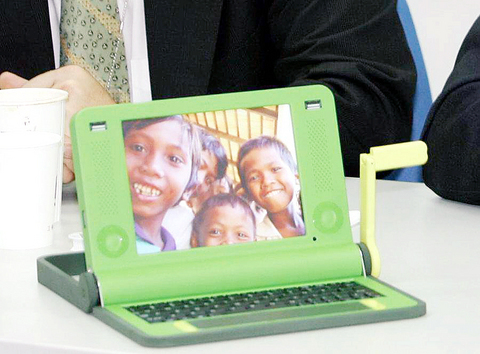The Media Laboratory from the Massachusetts Institute of Technology (MIT) is currently in talks with four local original equipment manufacturers to produce laptops under its "One Laptop Per Child" project.
Next month, the lab plans to launch a research initiative to develop US$100 laptops, which the lab says will revolutionize global education for children.
Speaking at a forum organized by the Industrial Technology Research Institute (ITRI, 工研院) yesterday, Nicholas Negroponte, the project director, said there are five companies bidding for the deal, including four Taiwanese vendors and one from South Korea.

PHOTO: HUNG YU-FANG, TAIPEI TIMES
He refused to name the bidders, except to say that the results will be announced within the next two weeks, and that only of the five bidding companies will be awarded a contract.
According to Negroponte, since the project was announced, the Media Lab has entered talks with nearly every contract manufacturer of liquid crystal displays (LCDs) and laptops.
Negroponte launched the US$100 laptop project at the World Economic Forum in Switzerland. Targeted at the world's 1 billion kids, the machines will work on a 500-MHz AMD processor, using flash memory instead of a hard drive. No massive data storage options will be offered, but they will come with four USB ports for connectivity and out-of-the-box wireless networking.
The utilization of an open source operating system for these laptops will boost the adoption of such systems, as most computers use Windows or Macintosh operating systems, Negroponte said. He added that the laptops will be bundled with simple software in order to keep costs down.
The rock-bottom price is possible in part through the removal of color filters from the LCD panels, which reduces costs by 35 percent. Economies of scale will be further increased as the machines use panels made by so-called "third-generation" fabs, whose production capacity is low because they are now several generations behind the cutting edge factories.
Negroponte said the inspiration for the project came when he was involved in launching laptop campaigns for primary schools in Cambodia.
The first English word the kids learned was "Google." Their parents were excited to see their kids bring home laptops for many reasons -- including illumination in the home. Many rural areas in Cambodia have no electricity.
"Today's laptops are just too expensive for everybody to own," Negroponte said.
The US$100 laptops are expected to start rolling off production lines by the end of next year, with volumes amounting to 5 million to 10 million units. The pilot projects will cover seven developing countries, including China, India, Egypt, Nigeria, Brazil, Thailand and Argentina.

Right-wing political scientist Laura Fernandez on Sunday won Costa Rica’s presidential election by a landslide, after promising to crack down on rising violence linked to the cocaine trade. Fernandez’s nearest rival, economist Alvaro Ramos, conceded defeat as results showed the ruling party far exceeding the threshold of 40 percent needed to avoid a runoff. With 94 percent of polling stations counted, the political heir of outgoing Costa Rican President Rodrigo Chaves had captured 48.3 percent of the vote compared with Ramos’ 33.4 percent, the Supreme Electoral Tribunal said. As soon as the first results were announced, members of Fernandez’s Sovereign People’s Party

MORE RESPONSIBILITY: Draftees would be expected to fight alongside professional soldiers, likely requiring the transformation of some training brigades into combat units The armed forces are to start incorporating new conscripts into combined arms brigades this year to enhance combat readiness, the Executive Yuan’s latest policy report said. The new policy would affect Taiwanese men entering the military for their compulsory service, which was extended to one year under reforms by then-president Tsai Ing-wen (蔡英文) in 2022. The conscripts would be trained to operate machine guns, uncrewed aerial vehicles, anti-tank guided missile launchers and Stinger air defense systems, the report said, adding that the basic training would be lengthened to eight weeks. After basic training, conscripts would be sorted into infantry battalions that would take

GROWING AMBITIONS: The scale and tempo of the operations show that the Strait has become the core theater for China to expand its security interests, the report said Chinese military aircraft incursions around Taiwan have surged nearly 15-fold over the past five years, according to a report released yesterday by the Democratic Progressive Party’s (DPP) Department of China Affairs. Sorties in the Taiwan Strait were previously irregular, totaling 380 in 2020, but have since evolved into routine operations, the report showed. “This demonstrates that the Taiwan Strait has become both the starting point and testing ground for Beijing’s expansionist ambitions,” it said. Driven by military expansionism, China is systematically pursuing actions aimed at altering the regional “status quo,” the department said, adding that Taiwan represents the most critical link in China’s

EMERGING FIELDS: The Chinese president said that the two countries would explore cooperation in green technology, the digital economy and artificial intelligence Chinese President Xi Jinping (習近平) yesterday called for an “equal and orderly multipolar world” in the face of “unilateral bullying,” in an apparent jab at the US. Xi was speaking during talks in Beijing with Uruguayan President Yamandu Orsi, the first South American leader to visit China since US special forces captured then-Venezuelan president Nicolas Maduro last month — an operation that Beijing condemned as a violation of sovereignty. Orsi follows a slew of leaders to have visited China seeking to boost ties with the world’s second-largest economy to hedge against US President Donald Trump’s increasingly unpredictable administration. “The international situation is fraught